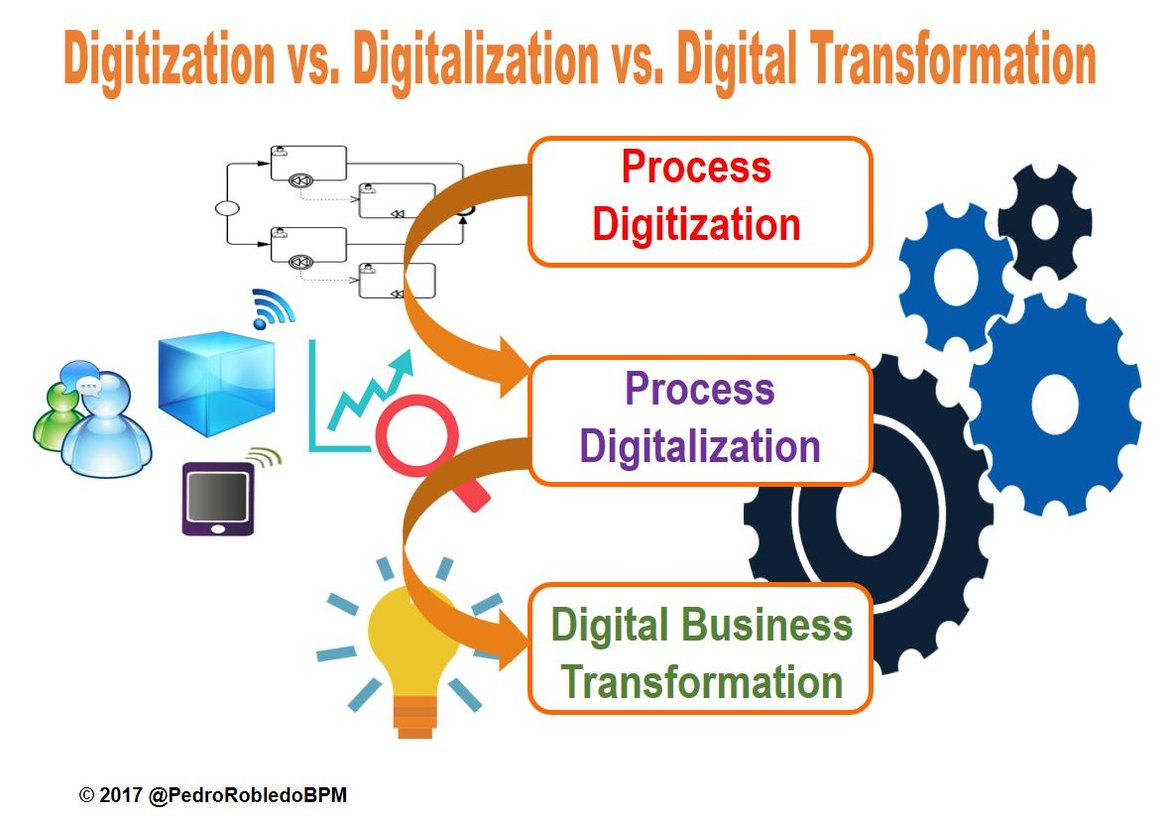¡HI! If you want to propose us a project, send a mail to info@albatian.com


ALL INFORMATION ABOUT
BPM, PROCESS, R & D, TECHNOLOGY
PROCESS DIGITALIZATION IN DIGITAL TRANSFORMATION
By Pedro Robledo, BPM process management expert

In a VUCA world (Volatile, Uncertainly, Complex and Ambiguous), companies are forced to innovate and adapt permanently to remain competitive and succeed. Mainly in the digital revolution where we find ourselves, where disruptive businesses appear that emerge even bypassing traditional barriers between sectors, changing the essence of traditional businesses and in many cases transforming products into services. This digital revolution is an opportunity, but it is also an obligation because customers are increasingly digital, have more information, compare, seek greater value and desire a more satisfactory customer experience, which implies companies to evolve technologically and culturally, so they will create their digital strategy that will mark the path of innovation they need.
Digital innovation in companies requires reviewing all current processes to make the necessary changes to achieve their digital and corporate objectives. The current confusion lies in whether companies stay in the digitization of business processes or actually perform a digital transformation of the business. There are two terms. "Digitization" and "Digitalization", but they have different nuances that we should think about them. In addition, the terms "Digitization" and "Digital Transformation" are mixed in many texts, which also have important nuances to consider. Let's look at the differences between the three terms:
- Process Digitization: Pass a process to digital format that could reproduce the process as it is (AS-IS) or it could improve what is already being done to include some optimization of the process. Often, companies indicate that they have been digitized (understood as "Digitization") justifying that they have reduced or eliminated almost 100% of the paper (digitally storing the information) and that instead of manual processes they have created models of processes represented digitally under BPMN notation - Business Process Model & Notation - which have even been able to automate paper-based manual processes to be executed with vertical applications that solve the task chain, or even have been able to opt (more successfully) to use a BPM:Workflow engine (Business Process Management) that manages the process to perform a complete orchestration of all process flows. This Digitization is a good start, but it is not a Process Digitalization nor a Digital Transformation
- Process Digitalization: When digitalizing processes, it means that some digital technologies are being used in the processes and managing data digitally (digitized data and digitally native data), in order to convert processes (not simply digitization) into processes more efficient, more productive, more profitable and with greater customer satisfaction in their digital and physical experience with the company. Therefore, digitalization allows the use of digital information to optimize business results and create new revenue, optimize costs, new customer experience ... offering so much value when applying digital technologies.
- Digital Business Transformation: It is about doing things differently - creating new business designs by using digital technologies. It is not just about automating or inserting technology into an existing process (digitalization) to optimize the current value chain, but to go further, modifying the business model, changing the value chain and surely creating a new supply of products and services ( caused by the application or incorporation of digital technologies in the products or services prior to the transformation), which lead to a new and better way to provide customer value. And they will require the modernization, rationalization and simplification of the current business processes, as well as the creation of the new key processes necessary for the new business rethinking.
The Digital Transformation of a Business presents enormous opportunities for innovation and competitive advantages, which will require a complete rethinking of the organization: cultural, strategic, technological, operational changes ... where processes play a fundamental role together with the data. But Digitization does not cause a transformation, it is necessary to insert digital technologies into existing processes to achieve a business evolution (Digitalization), taking advantage of digital data, provide more value to customers, obtaining an increase of revenue and optimization of business processes. But the digitalization is insufficient for a complete digital transformation of the business, as it will be necessary to respond to the new business models supported by new automated business processes that allow to offer the new offer of products and services to its customers.
RELACIONADO
-
Digital Transformation Life Cycle
by Albatian Nov. 14, 2016
-
Lean+SixSigma+TOC provide methods for continuous process improvement in BPM
by Albatian Feb. 13, 2017
-
The missing link
by Albatian March 27, 2017
-
BPM is key to the Digital Transformation
by Albatian Oct. 4, 2016
-
Agile, the last trend in information technology
by Albatian Feb. 19, 2017
-
Prevención y Gestión de los Riesgos Legales en la Empresa, algo más que una visión Penal
by 4 May 8, 2017
-
Any Business Innovation and Transformation requieres an Enterprise Architecture
by Albatian March 27, 2017
-
Not enough with an independent Management of a Process
by 4 May 9, 2017
-
How to Calculate the ROI of a BPM Initiative?
by 4 July 9, 2017
-
A strong Enterprise Architecture practice will help prepare organizations for GDPR
by 4 Sept. 18, 2017
-
Interoperability: The gordian knot of the digital business
by 4 Dec. 7, 2017
-
Managing the customer experience is general value for the brand
by 4 Sept. 6, 2018
-
Differences between Processes, Procedures and Work Instructions
by 4 Dec. 7, 2017
-
Process Mining plays an essential role in Digital Transformation
by 4 Sept. 6, 2018
-
BPM is the most effective discipline of business management
by Albatian Sept. 15, 2016
-
Industry 4.0: the bpm challenge
by 4 July 9, 2017
-
Before automating a process ... improve it!
by 4 Jan. 8, 2020
-
How to guide organizations in Maturity in BPM?
by 4 March 16, 2019











